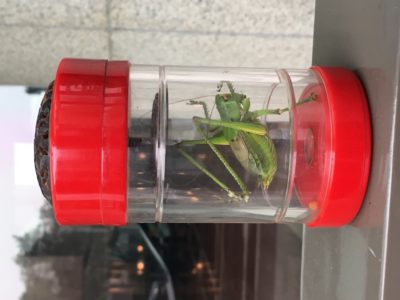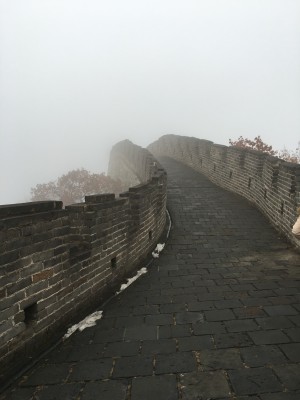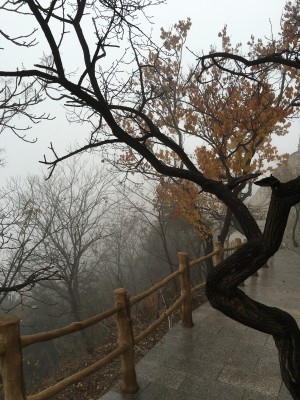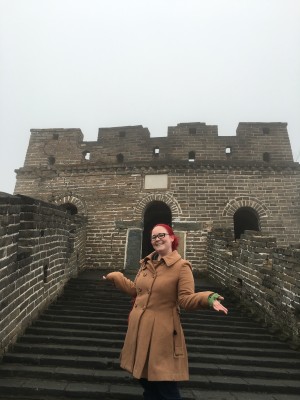Mastos abroad: The China Chronicles (Part 1)
It surprises me how often people think I am unflappable. A lot of times people asking questions say things like, “I know this is stupid,” or “I did a really stupid thing” or “You are going to think I am an idiot.” We all do dumb things sometimes. We all get confused.
I do not think you’re stupid and I do not think you’re an idiot. In that spirit, I would like to share some stories to ensure you that sometimes I am not just flappable but next level flappable. I flap. A lot.
People who have been following along for a while may remember that I went to China in 2015. Seeing the Great Wall has always been a dream of mine. I am fortunate to have a dear friend who lives in Hong Kong for half of the year. She has MCAS and we met because she came to Boston for treatment. She invited me to Hong Kong and suggested we take a tour to mainland China. After spending a few days in Hong Kong, we flew to Beijing on November 10.
There really was no way to prepare myself adequately for mainland China. Hong Kong struck me as a European city with Chinese sensibilities. Mainland China could be compared to nothing. It was like an all you can eat buffet that somehow also had a scarcity of food. I’m amazed I didn’t see anyone get run over while I was there since the locals just hurled themselves haphazardly into traffic. The pollution was unlike anything I have seen before and the entire city smelled like coal.
There was no social understanding that people should be orderly and wait in line or take turns. Louise, our tour guide, warned me, “Do not be a gentle lady.” I am not a gentle lady so I was tossing old ladies out of the way in no time. I will remember this for the rest of my life because it was the only time I have ever been called gentle and it will probably never happen again.
I had wanted to travel to Asia for years before I actually got there. The main reason I hadn’t gone was because my health is unpredictable and I was afraid to receive medical care there. I was also worried that they would confiscate critical meds or supplies. I don’t speak any Asian languages and I was concerned that I wouldn’t be able to communicate effectively in a health care setting.
Because of how nervous I was about needing medical attention in Beijing, I basically traveled there with nothing but meds and supplies for both routine use and emergencies. I flew with a set of three nesting luggage pieces, my backpack with infusion meds and pump, and another bag. The only things I brought that weren’t meds or supplies were three changes of clothes, sneakers, spare glasses, my journal, an electrical converter, a plug adapter, and an iPad. I bought everything else there or got it from Pat.
The other thing that had held me back from travel to Asia was food. I couldn’t eat soy, seafood, vinegar, or fish sauce. It is almost impossible to find food in China that does not contain any of those. I was fine in Hong Kong because I was staying at Pat’s house and we had ready access to fresh groceries and a full kitchen. I didn’t have those things in mainland China and didn’t expect to have them.
The staff at our hotel (the Peninsula) were unbelievably helpful and accommodating of our food restrictions. They came to our room to get a list of what we could safely eat and what we could not. They made us boxed lunches to bring with us on the tour. They made breakfast items that weren’t on the menu because I couldn’t tolerate anything else. Our dinners were carefully made without contamination. We didn’t need to get food anywhere else. Truly, it was an amazing experience. They could not have been more accommodating.
I sometimes print images of places I want to go and paste them into my journal as a reminder to live my life with purpose. The Forbidden City was one of those places. We visited it the day after we arrived. It was a palace for the Emperor that was more likely a small city. The day after we arrived in Beijing, Pat and I passed under a spectacularly large picture of Mao Tsetong and entered this magical place. It was stunning and amazing and better than I had imagined.
The following day was a day I had waited decades for. I was finally going to see the Great Wall of China. Our tour guide recommended that we visit the Wall at a less visited site called Mutianyu to hopefully avoid big crowds. As we drove out of Beijing proper, Louise told us things about the neighborhoods we passed and stories about Chinese history. We chatted about the effects of Communism on her generation versus her parents’ and grandparents’. She was intelligent and spoke really impeccable English.
I lost most of my hearing years ago. I can’t hear high pitched sounds really at all. As we were driving out, Pat turned to me and asked, “Can you hear that?” I couldn’t. I asked what it sounded like and she said she wasn’t sure. She kept hearing it. I kept not hearing it because Deaf. She started looking around in the car. “It’s like a chirping,” Pat explained. Finally, she asked Louise if the chirping was the ring tone on her phone.
We were pulling into a parking spot when Louise answered that she thought it was the driver’s. She asked him in Mandarin if it was his phone. After he parked the car, he reached into his jacket pocket.
I wasn’t looking at them when he pulled it out. I turned back to find him holding out a small cage with an enormous cricket in it. This was the biggest cricket I have ever seen. Easily the size of my palm and black. It was so large that you could see all the features of its creepy little face including its eyes looking back and forth.
If I had been aware that I was going to encounter a cricket the size of Rhode Island on this trip, things might have gone better. But I wasn’t so they didn’t. I’m not sure exactly what happened but I screamed and starting flapping my hands hysterically while making a noise that was sort of like turkeys gobbling.
“Is that the international sign for “get that thing the hell away from me?” Pat asked. It was in fact the international sign for get that thing the hell away from me.
I felt it best not to make eye contact with the cricket as it sized me up. The driver explained that this cricket was a fighting cricket and that people would have cricket fights and bet on the outcome. He kept it in his pocket in case he came upon an impromptu cricket fight. You know. Just to be prepared in case that happened.
Pat asked if this cricket was a champion. Louise translated his response.
“He wants you to know that yes, this cricket is the champion, and also, that if this cricket bites you, you will bleed.” And you know? I believe that. It had to be carried around IN A CAGE. This thing was clearly a menace.

The Great Wall was a good distraction from the fact that this cricket was sharing the van with us. It was so foggy. Like walking into a cloud. It seemed to swallow the wall and me with it in the cold damp. After we took the cable car down from the Wall, Pat and I went into a shop looking for something to warm us up. There was a little coffee shop in the visitor’s center. I ordered a small coffee to have something hot. Pat did the same. We sat at a little table outside drinking our coffee while we waited for our driver to pick us up.
For the record, this cup of coffee was the ONLY thing I consumed in Beijing that was not made by the Peninsula. Somehow, despite my excessive fretting over food and drink contamination in China, I decided that this shady little café was definitely capable of making me coffee safely and that it would be fine. I have no excuse. I just flung caution into the polluted Chinese wind.

As I sat there, sipping my coffee and staring into this grey abyss, I thought to myself, “This is a lot sweeter than I thought it would be.” This didn’t worry me at all. I have no defense. I continued to drink it. I drank the whole thing in about five minutes and got into the van to go the Ming Tombs, the next stop on our tour.
As you might be expecting, that van ride turned into a circus real fast. About fifteen minutes after drinking the coffee, literally within seconds of each other, Pat and I both started having symptoms. It quickly became apparent that this coffee wanted out of our bodies. For me, the coffee felt that vomiting would be the path of least resistance. For Pat, it charged through her GI tract all the way down.
The road we were driving along was punctuated by people sitting on the side of the road and burning hell money, a ritual that they believe will provide their deceased loved one money to spend in heaven. Literally every 100 feet or so had what looked like a small garbage fire being tended to by locals wearing masks. When we finally got to a stretch of road that wasn’t hosting small fires of fake currency, I told Louise that we needed to pull over. I threw up on the side of the road. I threw up enough that poor Louise got out of the van to pat my back while I puked everywhere. Making memories.
I felt better after I threw up but Pat was still having some problems. Our tour guide assured us we were only a short distance from the next stop. After fifteen very long minutes, we jumped out of the van and ran to the bathroom. We told the driver to park as close to the bathroom as possible in case we needed to get out of there quickly. Our tour guide ran with us while the driver went to find a parking spot.
Once Pat was safely in a stall, I walked out of the bathroom to see if the driver had found us. As I was looking for him, the gates flew open on the far side of the parking lot as a van came screeching through the fence. The van pulled up close to the bathroom and slammed on the brakes. The driver jumped out and opened the van door so his passengers could get in quickly. It was our driver.
The good news is that Pat did not shit her pants. The bad news is we were trapped in that bathroom for a while. There were a couple of chairs near the bathroom entrance that we commandeered for a while while we waited to see if this was going to pass or not. Long suffering and committed Louise knelt down on the bathroom floor holding a map and calmly telling us the history of the site while we waited to see our intestines would continue wrenching. We learned all about the Cultural Revolution and how adherents to communist philosophies had permanently damaged ancient monuments and works of art. On the bathroom floor. At a very busy tourist attraction.
After about half an hour, we told Louise that we were ready to brave the world outside of the bathroom. She was very pleased by this turn of events. She led us into the main courtyard and told us about the people entombed there. There was a door where it is traditional for people to walk through, then to walk backwards and hop over the threshold backwards so as not to be trapped in the land of the dead. I was feeling pretty cocky since I hadn’t puked in 40 minutes so I went for it. (I did not get trapped in the land of the dead, if you’re wondering. I think.)
I looked at Pat to ask her if she was feeling up to it. Her response was, “If I don’t keep both feet on the ground, something is coming out of one end or the other and I’m not sure which one.” She’s a lot more practical than me. We carried on with the tour.
Pat and I had some other adventures in China that I’ll get around to writing about someday. I’m sure we’ll have more if I ever get to Hong Kong again.
Anyway, see my point? I’m totally flappable. Your questions are not stupid. You are not stupid. It’s all good.
More posts about my trip to China here:

